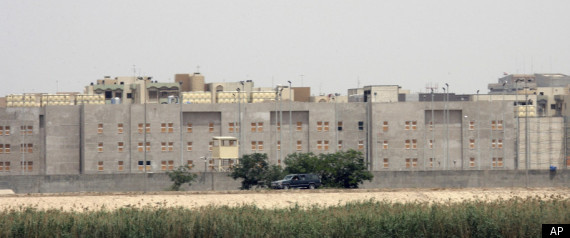Massive U.S. Embassy In Iraq Will Expand Further As Soldiers Leave

Massive U.S. Embassy In Iraq Will Expand Further As Soldiers Leave

WASHINGTON -- American combat troops in Iraq may be heading to the exits -- or not -- but the U.S. government's enormously expensive intervention there is hardly coming to an end.
In a telling sign of how dangerous and chaotic Iraq remains more than eight years after President George W. Bush launched the war against Saddam Hussein, U.S. diplomats, military advisers and other officials are planning to fall back to the gargantuan embassy in Baghdad -- a heavily fortified, self-contained compound the size of Vatican City.
The embassy compound is by far the largest the world has ever seen, at one and a half square miles, big enough for 94 football fields. It cost three quarters of a billion dollars to build (coming in about $150 million over budget). Inside its high walls, guard towers and machine-gun emplacements lie not just the embassy itself, but more than 20 other buildings, including residential quarters, a gym and swimming pool, commercial facilities, a power station and a water-treatment plant.
Yet the embassy is turning out to be too small for the swelling retinue of gunmen, gardeners and other workers the State Department considers necessary to provide security and "life support" for the sizable group of diplomats, military advisers and other executive branch officials who will be taking shelter there once the troops withdraw from the country.
The number of personnel under the authority of the U.S. ambassador to Iraq will swell from 8,000 to about 16,000 as the troop presence is drawn down, a State Department official told The Huffington Post. "About 10 percent would be core programmatic staff, 10 percent management and aviation, 30 percent life support contractors -- and 50 percent security," he said.
As part of that increase, the State Department will double its complement of security contractors -- fielding a private army of over 5,000 to guard the embassy and other diplomatic outposts and protect personnel as they travel beyond the fortifications, the official said. Another 3,000 armed guards will protect Office of Security Cooperation personnel, who are responsible for sales and training related to an estimated $13 billion in pending U.S. arms sales, including tanks, squadrons of attack helicopters and 36 F-16s.
Under the Status of Forces Agreement negotiated between Iraq and former President Bush in 2008 -- and, at least thus far, still in effect -- all U.S. troops are supposed to leave the country by the end of this year.
As of now, there are about 45,000 U.S. troops still in Iraq. Obama administration officials had been hoping the Iraqi government would allow at least 10,000 to remain past the end-of-the-year deadline. Earlier this month, however, they floated the idea of keeping only 3,000. But given the unpredictable nature of the fractured Iraqi leadership, nothing is certain.
As the Department of Defense pulls out and its spending drops, the State Department is expecting its costs to skyrocket. State asked Congress for $2.7 billion for its Iraqi operations in fiscal year 2011, and got $2.1 billion. It wants $6.2 billion for next year. The Senate Foreign Relations Committee estimates that State's plans will cost $25 to $30 billion over the next five years.
Patrick Kennedy, undersecretary of state for management, told the Commission on Wartime Contracting in June that State intends to pay $3 billion in the next five years on its major private security contracts alone.
While $6 billion a year might not seem like much compared to the estimated $806 billion in direct appropriations spent on the Iraq war and reconstruction thus far, that is still an enormous amount of money. Consider, for instance, that the State Department's total operating budget this year is about $14 billion.
Money isn't the only resource being drained by Iraq. The toll on the diplomatic corps is substantial.
In addition to staffing the embassy in Baghdad, the department intends to have more than 1,000 people on staff at each of its two consulates, making them far larger than all but the most important U.S. embassies around the world. Given the de facto partitioning of Iraq, one consulate, in Erbil, will essentially be an embassy to the Kurds; the other, in Basra, an embassy to the Shia -- and to the country's biggest oil fields.
Steve Kashkett, then the head of the American Foreign Service Association, complained at Hillary Clinton's very first town hall meeting as secretary of State that the cost of creating the largest diplomatic mission in U.S. history "has been to take people away from all of our other diplomatic missions around the world, which have been left understaffed and with staffing gaps." A Government Accountability Office report in 2009 concluded that filling the numerous positions in Iraq and Afghanistan meant that "key positions at other hardship posts remain vacant or are filled by officers who may lack the necessary experience to effectively perform their duties, potentially compromising States ability to advance U.S. international interests."
Massive U.S. Embassy In Iraq Will Expand Further As Soldiers Leave

